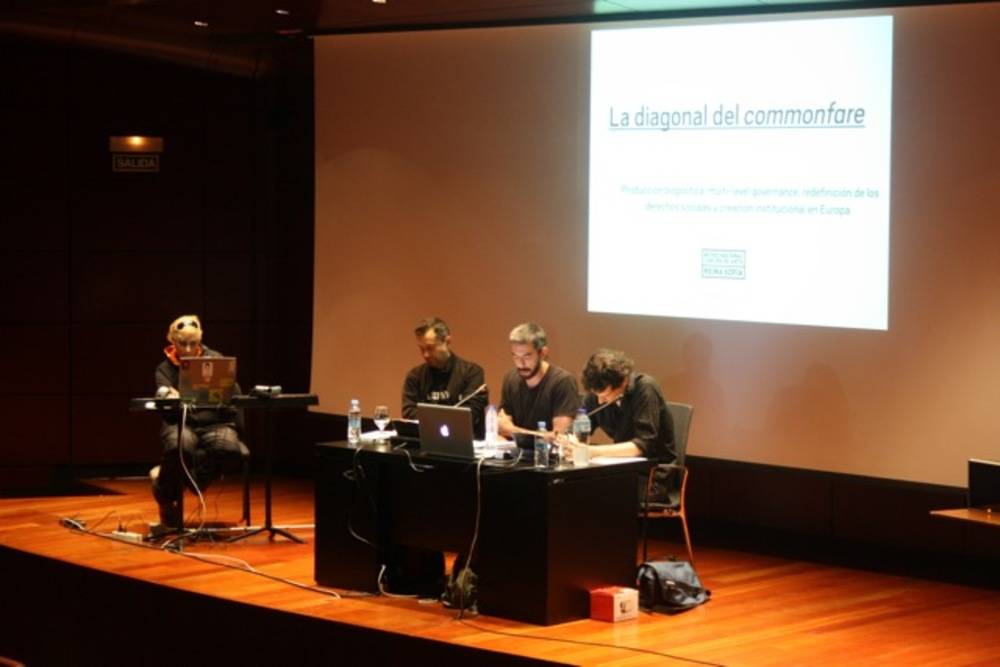THE DIAGONAL OF COMMONFARE. BIOPOLITICAL PRODUCTION, MULTI-LEVEL GOVERNANCE, REDEFINITION OF SOCIAL RIGHTS AND INSTITUTIONAL CREATION IN EUROPE.
This seminar is addressing the question of why a federal Europe is not “optional” for new political creations in Europe but rather one of their genetic preconditions. We might say that if the root is rotten, Europe will have to make use of the weeds which have grown up around its dead trunk.
Europe is not only a project of federated States and a geopolitical problem, it is also the crossroads for a redefinition of the meaning and the historical and biopolitical vectors of “The West.” And yet 2010 marks the end of a lost decade in the process of European federalization and integration and the beginning, in the context of the economic and financial crisis, of the process of populist re-nationalization and the re-confederalization of the internal and external dynamic of the Union which, in the absence of new emancipatory conflicts, only seem to presage terrible years of lead to come.
The “Lisbon Strategy” of the European Commission and Council and their internal aporias, manifest in how the EU has run aground in the present systemic crisis, bring us directly and urgently to how little the strategies for constructing a European “kosmopolitischer Imperium” have been thought through: the normative power of the claims expressed by social conflicts, the constitutive power of the forms of life of biopolitical production. This “unthought” alludes to the immanent matrices of European alter-modernity, the historical presentations of which have been successively expelled from representation as political monstrosities: Anabaptists, Communards, Diggers, Levelers, “die ‘andere’ Arbeiterbewegung”, the discontinuous and tragic history of which allow us to grasp the unrecognized political valence of the monstrous figures of exploitation and biopower in contemporary Europe: the banlieusards, the “undocumented”, the “second generation”, the “domestic workers”, the various precarities of sex and care, “pirates” of info-production and “intermittent workers” in the arts, culture and Pascalian “divertissement”, now transformed into “the creative industries.”
The genealogy, the struggles and the defeats of these figures are the explicative key to the mutations of production, of the institution, of representation and of art, not vice versa. Those who have been expelled from the Volk, from popular sovereignty, from political representation, and who constitute the anthropological base of a post-national political entity and therefore of a social attribution of production and of wealth, capable of breaking with the epistemological and political obstacle of the “national forces” of work and of the white, nationalist, masculine, heterosexual, industrial and hereditary attribution of value, of generating, of the sources of wealth. When we talk about the “common”, the ontological accumulation which the “factories of the human” have produced in the very bosom of capitalist postmodernity, we are speaking of nothing less than the obstinate and dogged power of these alter-modern singularities. For all the political subjects of the European situation, time is on the threshold between ripeness and rot… time is out of joint.
The hypothesis of a European “commonfare”, that is, an inscription which is normative, institutional and programmatic-political of the common as source of wealth, which therefore guarantees its free reproduction and the reproduction of the productive singularities which cross through it, constitutes one of the keys for getting out of the European impasse, inseparable from the construction of a European space-time based on the struggles arising from the new class composition in its postcolonial and post-Fordist metropoli.
More than a “defense” of national Welfare States – of those Welfare States based on the redistribution of the “wealth of nations” which are now doomed to become a weapon of blackmail by corporatism of all kinds, national populism and new fascisms – the European federal dream, antifascist and antinationalist, could crystallize, as an institutive and constitutive dynamic, a (European) Welfare of the common in a continental (and therefore necessarily global) bid for the biopolitical time of production against the axiom of scarcity, precarity, inequality, segregation, individualization and environmental devastation as the necessary conditions of accumulation.
